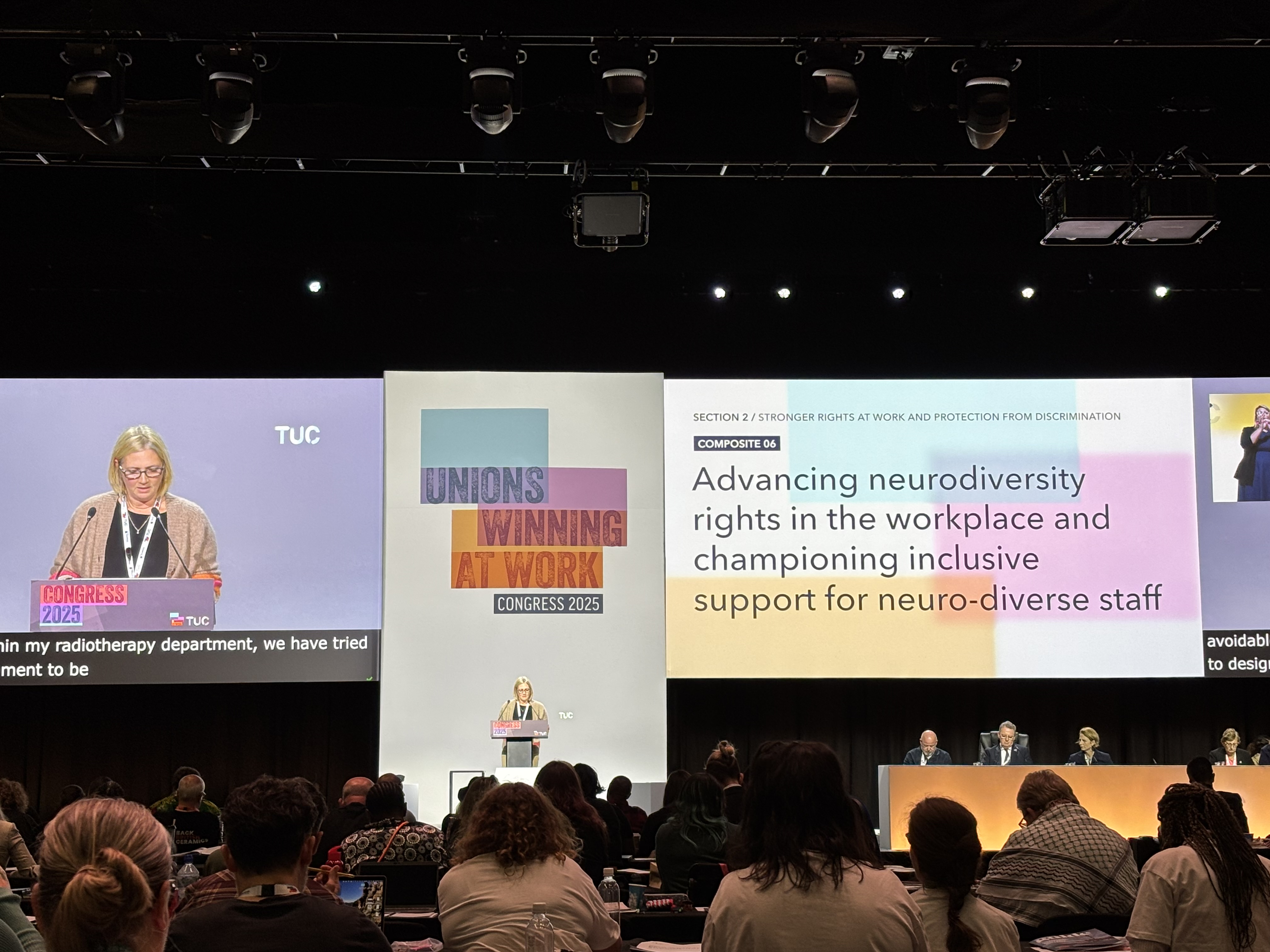
SoR vice president Susann McCrackan addressed attendees at the TUC Congress for the first time as motion C06, a motion supporting neurodiversity rights and inclusive support for staff in the workplace, was carried.
Motion C06 was proposed by the Society of Radiographers and seconded by Aegis, a finance sector union. The motion outlines how neurodivergent staff face difficulties in the workplace - despite the protections afforded under the Equality Act 2010 - and suggests adjustments to make the workplace more accessible.
Motion C06: TUC 2025
“I am Susann McCracken from the Society of Radiographers. This is my first time speaking at congress. I am proud to move Composite 6: Advancing neurodiversity rights in the workplace and championing inclusive support for neuro-diverse staff.
It is estimated that in the UK, 15-20% of the population are neuro-divergent. This translates to approximately 13 million people. Meanwhile The Office for National Statistic reported that in 2021, just 29% of people diagnosed with autism were employed, whilst in 2023 50% of managers reported feeling uncomfortable hiring a neuro-divergent person with as little as 28% of managers saying that they had ever received neurodiversity training. These figures are hugely indicative of how our current systems are actively excluding or restricting a significant number of individuals who either are struggling in our workforce or who could significantly contribute within it if given the chance.
“Too often the reality is that workplaces have chaotic, reactive, and overstressed environments. This reduces efficiency, is unproductive and leads to poor customer support and service. This prompts a negative reaction and that feeds into a negative cycle. Nowhere is this more obvious than the NHS.
“These environments can be crippling for neuro-diverse staff, leaving them struggling to function in the often loud, unpredictable and chaotic spaces. These struggles then impact on our patients, avoidable errors impacting their care and clinical outcomes.
“Within my department we have tried to design our work environment to be inclusive for our current staff. We offer flexible work arrangements, quiet spaces and spaces with dimmed lighting, team hand overs with clear instructions as to what has to happen that day. For our patients we have introduced a communications passport. This enables them to be able to give any department clear instructions as to what they need without having to go into detail every time as to what and why they need it. This allows us to know ahead the environment; the staff and the triggers that we will need to successfully undertake this individual’s appointment with us, setting the staff and patient up for success, not failure.
“If success is to be achieved by all, let’s stop asking neuro-divergent individuals to adapt to systems that weren’t built for them. Instead let’s rebuild those systems - so that they work for everyone.
“This motion doesn’t just call on employers and governments to do something. It also calls for unions to be better leaders in this space. In the SOR we are taking this issue seriously and we are offering leadership training to employers, reps and members. This doesn’t have to be expensive to be effective. We are constantly highlighting positive examples within our communications to all reps and members; we are constantly refining and updating professional guidance, standards and training for managers and members. We are supporting our officers through the NAS Autism Champion training programme and rolling this out as part of our mandatory rep training ensuring that we acknowledge and action the importance of integrating our EDIB policy into all of our industrial and health and safety rep training programmes.
“Inclusion is not a box to check. It is a commitment, a culture, and a continuous journey. Conference, I Move.”
(Image: Susann McCracken speaking at the Trade Union Congress, via the SoR)
